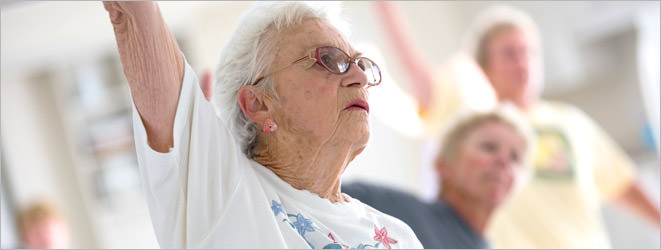Susan Hardy, MD and colleagues recruited 439 adults age 65 and older to assess multiple possible predictors of mortality that could be used in primary care. Their results were published recently in the Journal of American Geriatric Society. They performed physical assessments on all participants at baseline. Seniors who showed no improvement in habitual gait speed after one year experienced an eight year mortality rate of 49.3%. Participants who showed a gain in gait speed during a quarterly assessment but lost the gains by the one year assessment experienced a mortality rate of 41.2% over the next eight years. Seniors who showed only a 0.1 meter per second improvement in gait speed after one year experienced a much improved mortality rate of 31.6% over the next eight years. Hardy et al also suggest that these findings may underscore the importance of prescribing interventions that affect habitual gait speed.
Therapeutic exercise can improve habitual gait speed in older adults. When patients qualify for home health, the convenience of home visits couple with the fact that Medicare pays 100% of home health may help motivate your patients to participate. Furthermore, physical therapy from Allegiance Home Health & Rehab will train your patients in a customized home exercise program that will remove barriers to future exercise (i.e. the need for special equipment, the need to travel to a gym, the need to go outside, fear of self-injury).
To qualify for home health, patients must leave home less frequently due to the taxing effort that leaving home requires. In addition, Medicare’s skilled need requirement generally looks for a recent occurrence to justify skilled services (i.e. a new diagnosis, recent exacerbation, recent illness, recent injury, programs with the Timed-Up-and-Go- test). Interventions for conditions such as congestive heart failure, arthritis, and COPD have shown positive effects on walking speed. Generally speaking, homebound patients will qualify for home health when a recent evaluation discovers a high risk of future falls. When your patients’ gait speed suggests that they have not fully recovered from a recent injury or illness or when your patients’ gait suggests a high risk of future falls, please consider a referral to Allegiance Home Health & Rehab. Allegiance may be able to progress your patient in to the group that experiences 36% better survival.
Hardy et al recruited patients from two primary care practices serving Medicare populations – making these results particularly relevant to primary care. We encourage primary care practitioners to make referrals directly from their offices. Patients using walking aides were included. Patients who were cognitively intact and patients who were mildly impaired, but with a caregiver, were included. Improvement in gait speed proved to be a strong predictor of mortality regardless of whether a patient had been hospitalized during the year.


